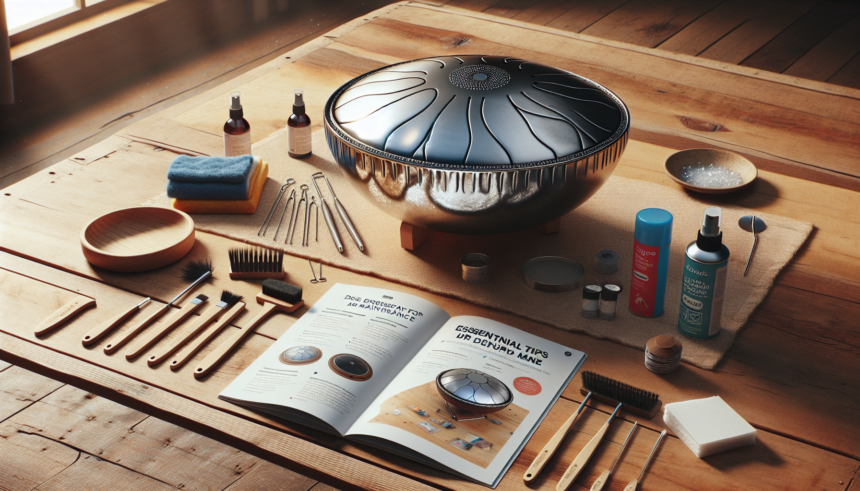Introduction
The handpan is a beautifully crafted musical instrument known for its ethereal and calming tones. Made primarily from steel, the handpan requires regular maintenance to keep it in pristine condition. One of the most common issues faced by handpan owners is rust. Rust not only affects the appearance of the handpan but also its sound quality. This article provides essential tips for de-rusting and maintaining your handpan to ensure it remains in perfect playable condition for years to come.
Understanding Handpan Materials and Rust Formation
Handpans are predominantly made of nitrided steel, stainless steel, or a similar alloy. While these materials are chosen for their acoustic properties, they can be susceptible to rust, especially if exposed to moisture and oxygen. Rust (iron oxide) forms when iron reacts with oxygen and water, leading to deterioration over time. Understanding this process is crucial in preventing and addressing rust issues.
Preventive Measures
Prevention is always better than cure. Here are some preventive measures to minimize the risk of rust formation on your handpan:
- Keep it Dry: Moisture is a primary catalyst for rust formation. Always wipe your handpan with a clean, dry cloth after playing, especially if your hands were sweaty or you were playing outdoors.
- Use Protective Oils: Applying a thin layer of protective oil, such as Phoenix Oil or Froglube, can create a moisture barrier. These oils are specifically formulated for handpans and offer anti-rust protection while maintaining the instrument’s quality.
- Store Properly: Always store your handpan in a cool, dry place. Avoid humid areas like bathrooms and basements. Use a handpan case with silica gel packets to absorb any moisture.
- Regular Inspections: Regularly inspect your handpan for any signs of rust or wear. Early detection allows for prompt action, preventing extensive damage.
De-Rusting Your Handpan
If rust has already started to form on your handpan, it’s essential to act quickly to remove it and prevent further damage. Follow these steps to de-rust your handpan:
Step 1: Gather Necessary Supplies
You’ll need the following items:
- Microfiber cloths
- Fine steel wool or a rust eraser
- Protective oil (like Phoenix Oil or Froglube)
- Isopropyl alcohol
- Gloves (optional, but recommended)
Step 2: Clean the Surface
Before addressing the rust, clean the surface of your handpan to remove any dirt and grime. Use a microfiber cloth dampened with isopropyl alcohol to gently wipe down the handpan. This will ensure that you’re not rubbing dirt into the metal, which can cause scratches.
Step 3: Remove the Rust
Using fine steel wool or a rust eraser, gently rub the rusted areas in a circular motion. Be careful not to apply too much pressure, as this can scratch the surface. For stubborn rust spots, you might need to spend a little more time, but patience is key to avoid damaging the handpan.
Step 4: Wipe Clean
Once you’ve removed the rust, use a clean microfiber cloth to wipe away any residue. Make sure the surface is completely clean and dry before proceeding to the next step.
Step 5: Apply Protective Oil
After removing the rust and cleaning the surface, it’s time to apply a protective oil. Put a small amount of oil on a clean microfiber cloth and gently rub it into the surface of the handpan. This will help to prevent future rust formation and keep the metal conditioned. Make sure to cover the entire surface evenly.
Ongoing Maintenance
To keep your handpan in top condition, incorporate these maintenance tips into your regular routine:
Regular Cleaning
Clean your handpan regularly with a microfiber cloth to remove fingerprints, sweat, and dirt. This simple step helps to prevent moisture buildup, which can lead to rust.
Reapply Protective Oil
Reapply protective oil every 1-2 months or as needed, depending on how often you play and the conditions in which you store your instrument. This will ensure that your handpan remains protected against moisture and oxidation.
Avoid Extreme Temperatures
Extreme temperatures can affect your handpan’s material and tuning. Avoid leaving your handpan in direct sunlight, near heaters, or in cold, damp environments. Sudden temperature changes can cause the metal to expand or contract, leading to potential damage.
Play with Clean Hands
Always wash your hands before playing your handpan to remove oils, dirt, and sweat. This prevents transferring these substances onto the instrument, which can contribute to rust formation and affect its sound quality.
Conclusion
Maintaining a handpan requires consistent effort and attention to detail. By following these essential tips for de-rusting and maintenance, you can extend the life of your instrument and ensure it continues to produce beautiful, resonant sounds. Remember, prevention is key; regular cleaning, proper storage, and routine inspections will go a long way in keeping rust at bay. With the right care, your handpan can be a lifelong companion in your musical journey.
Frequently Asked Questions
1. How often should I clean my handpan to prevent rust?
To prevent rust, you should clean your handpan after every use, especially if you played with sweaty hands or outdoors. Regular cleaning removes moisture and dirt that can contribute to rust formation.
2. Can I use any oil to protect my handpan?
It’s best to use oils specifically formulated for handpans, such as Phoenix Oil or Froglube. These oils are designed to provide anti-rust protection without affecting the instrument’s sound quality.
3. What should I do if I discover rust on my handpan?
If you discover rust on your handpan, act quickly to remove it using fine steel wool or a rust eraser. Follow up with a thorough cleaning and apply a protective oil to prevent future rust formation.
4. Can extreme temperatures damage my handpan?
Yes, extreme temperatures can affect the metal and tuning of your handpan. Avoid exposing it to direct sunlight, heaters, or cold, damp environments to prevent damage and maintain its sound quality.
5. How do I store my handpan to prevent rust?
Store your handpan in a cool, dry place, away from humid areas like bathrooms and basements. Using a handpan case with silica gel packets can help absorb any excess moisture, further protecting your instrument from rust.





